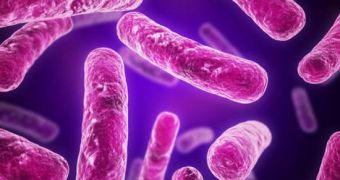A newly-engineered bacterium feature deoxyribonucleic acid (DNA) that does not include thymine, one of its four basic building blocks. Rather, the nucleotide was replaced with the synthetic unit 5-chlorouracil (c), which is usually toxic for other organisms.
The four bases that usually make up DNA are adenine (A), cytosine (C), guanine (G) and thymine (T). In an international effort, a team of researchers has demonstrated that it is indeed possible to construct new species of bacteria by engineering the very essence of DNA.
The nucleic acid plays a tremendous role in all known living organisms. It contains the entire collection of genetic instructions that lifeforms use for their correct development and normal functioning.
In order to conduct this investigation, researchers had to use a unique technology, that allows them to manipulate the evolution of organisms directly. The target lifeforms are being guided in their evolution inside a highly-controlled environment, where researchers control all environment parameters.
Experts can only afford to conduct such studies on microorganisms, because the latter produce new generation extremely fast. In the new study, microbial cells were exposed to the toxic 5-chlorouracil at sub-lethal levels for prolonged periods of time.
This allowed the cultures to undergo natural selection, with cells more capable of resisting higher concentrations of the chemical being favored in the process. Immunity to the effects of the toxin was achieved through the creation of genetic variants withing the microorganisms' DNA.
In order to keep the selection pressure constant, researchers constantly increased the concentrations of 5-chlorouracil as mutations occurred. Escherichia coli bacteria were then bred with a genetic modification that rendered them unable to synthesize thymine.
After about 1000 generations, the E. coli learned to use 5-chlorouracil as a substitute for thymine in their DNA. Genetic analysis of the nucleic acid revealed that extensive mutations had taken place to accommodate the important changes, Daily Galaxy reveals.
Details of the new work appear in a paper entitled “Chemical Evolution of a Bacterium’s Genome,” which is published in the latest issue of the top journal Angewandte Chemie International Edition.
The research effort was coordinated by expert Rupert Mutzel, from the Freie Universität Berlin Institut für Biologie and Philippe Marlière, of Heurisko USA Inc.
Researchers from the French Commissariat à l’Energie Atomique et aux Energies Alternatives (CEA) and the Katholieke Universiteit Leuven in Belgium were also a part of the investigation.

 14 DAY TRIAL //
14 DAY TRIAL //